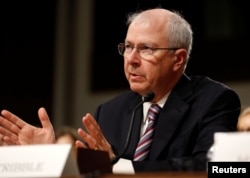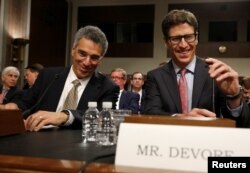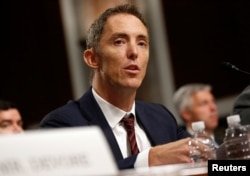U.S. communications and social media titans are urging lawmakers to craft strong, uniform protections for Americans' personal data without squashing innovation.
The Senate Commerce Committee heard testimony Wednesday from Apple, Amazon.com, Google, Twitter, and AT&T executives at a time when data breaches are commonplace, many Americans are mystified or unaware of how their personal data may be used or shared, and jurisdictions from the European Union to the state of California have taken action to safeguard consumers.
"Privacy means much more than having the right to not share your personal information. Privacy is about putting the user in control when it comes to that information. We believe that privacy is a fundamental human right, which should be supported by both social norms and the law," said Apple's vice president for software technology, Bud Tribble.
"In today's data-driven world, it is more important than ever to maintain consumers' trust and give them control over their personal information," said AT&T's senior vice president for global public policy, Leonard Cali.
The executives urged lawmakers to implement national standards that would preempt individual states from taking action on their own, as California has done.
"California is a single state, and if other states follow suit, we'll be facing a patchwork of rules and fragmentation that will be just unworkable for consumers, as well as mobile companies and internet companies," Cali said.
At the same time, senators were urged to craft legislation with care. Several witnesses described the European Union's General Data Protection Regulation, implemented earlier this year, as overly burdensome.
"Meeting its [the GDPR's] specific requirements for the handling, retention, and deletion of personal data required us to divert significant resources to administrative tasks and away from invention on behalf of customers," Amazon.com Vice President Andrew DeVore said.
DeVore added, "We encourage Congress to ensure that additional overhead and administrative demands any legislation might require, actually produce commensurate consumer privacy benefits."
Current proposal
Congress already has legislation to consider. Earlier this year, Minnesota Democratic Senator Amy Klobuchar and Louisiana Republican John Kennedy introduced a bill that would require companies to write terms of service agreements in plain language and allow consumers to review data collected about them and find out if and how it has been shared. Other proposals are likely to be forthcoming.
"The question is no longer whether we need a federal law to protect consumers' privacy," said the committee's chairman, Republican Senator John Thune of South Dakota. "The question is what shape that law should take."
Privacy questions
Several senators readily acknowledged that they did not grow up in the digital age.
"This thing sometimes mystifies me," Montana Democrat Jon Tester said, holding up his smartphone. Tester added that he was perplexed to see that, after searching for new tires for his truck, online advertisements for tires appeared on Web pages he subsequently visited.
"How the hell did they get that information?" he asked.
Google Chief Privacy Officer Keith Enright responded the search engine allows Web pages to earn revenue "by placing advertisements that may be targeted to a user's interests." But, he stressed, "No personal information is passing from Google to that third party — we neither sell it nor share it."







